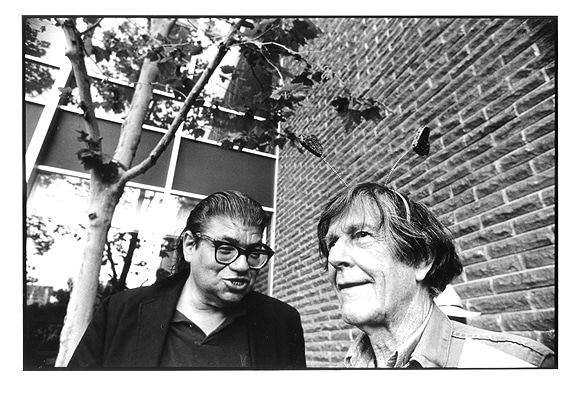London plans 24-hour new-music concert
NewsThe London Contemporary Orchestra and conductor Robert Ames are putting on a continuous 24-hour concert at the Barbican this weekend.
It includes Morton Feldman’s six-hour 2nd String Quartet No 2 along with works by John Cage, Éliane Radigue, Mica Levi, Alvin Lucier, Michael Gordon, James Tenney and Galya Bisengalieva.
Members of the audience are free to come and go as they please.
Full prog:
Saturday
6pm Michael Gordon Rushes
7pm KMRU x LCO
10pm James Tenny Having Never Written a Note for Percussion
11pm Galya Bisengalieva Saǧat
Sunday
12am Morton Feldman String Quartet No. 2
6am Éliane Radigue Trilogie de la Mort
9am Alvin Lucier I Am Sitting In A Room
10am Powell x LCO
1pm John Cage Eight
2pm Actress x LCO
5pm Mica Levi Thoughts Are Born






“Members of the audience are free to come and go as they please.” A generous safety measure by the organisation.
It is something like: I wrote a book, but you don’t have to read it. Because for me, it does not make much difference whether you read parts of it, or as a whole, or not at all. Because, it’s enough that it’s there, and the extent to which it is experienced is entirely indifferent to me.
Or: I say something to you but I don’t care a damn whether you listen or not.
Or: I write music all for my own pleasure, and not as a contribution to something. It is a ‘thing in itself’, objectively so, that’s how Hungarian avantgarde composer Ligeti has formulated it. (This is entirely true.)
That is also Kant’s philosophical formulation, “ding an sich”, or, in English, “Who cares if you listen.” (Gelatt/Babbitt)
Indeed. But it must be admitted that that title was not Babbitt’s, it was the interviewer’s, who (rightly I think) concluded that this was what the implications were of Babbit’s philosophy of music.
And Ligeti said in an interview, about his music: ‘It’s not for the audience, it’s not even for myself, it is a thing in itself.’ Meant is: the work as a self-contained whole, without references to something outside. This is, philosophically, the world view of rational objectivity: we can never know the ‘thing in itself’ because our senses come in between, indeed according to Kant and a lot of other Western philosophers. In this way, the work does not want to convey something, it merely represents something. It is supposed to have no meaning for someone else, it is its own meaning.
Why would someone put much effort into a work if it is meant to be meaningless? To make a statement: this is a work that only means itself and does not need your emotional world to touch. It is sound art: the interest is in its patterns and sound effects, objectively so, and indeed that can be interesting and aesthetically pleasing.
Music (as different from sound art) has all of that too, but on top of that there is a whole world of experience brought by the work. Postwar modernism wanted to get rid of all of that, seen as a romantic, outdated cult of the boozjwazee. The war had shown that there’s nothing in the world but matter, force, cruelty, complexity, and that there’s no meaning, and no value; and all those other things were subjective, underdeveloped fantasies.
Or: I write music for my own pleasure and as a contribution to the art; but you are welcome to enjoy it or not.
The difference between modernist music and modernist visual art is, that in a museum you are free to stand still and watch, or shrug your shoulders and walk on. The viewer is much less subjectively committed at that very moment of experiencing the work of art. He is still free to get emotionally involved or not, the thing does not make sound and you don’t have a prescribed duration of time you have to stand there, when you have bought an entrance ticket. But with modernist music you committed yourself beforehand to sit still for the duration of the work (at least), whether you will like the experience or not. So, your initial commitment is much greater and the chances of being bored, offended, tickled, stimulated, enraged, uplifted, moved to tears, shocked, etc. etc. are so much greater.
Sounds like a real bundle of joy!!!! Trilogy for the dead at 6am, can’t wait…
New ?
Contemporary?
Feldman from 1983
Cage from 1981
Lucier from 1961
Exactly like someone in 1850 still calling Beethoven and Haydn modern.
But they WERE modern, and still are – if ‘modern’ is understood as: having something interesting and appealing to say to us, modern people. The concept of ‘modern’ is mostly greatly misunderstood and used in the most ignorant way possible.
It’s new if you haven’t heard it before.
Maybe try to read Heller’s “Catch-22” while listening and perhaps everything will make some sense?
Again, you are free to come and go as you please….
Back to the 60s- everything old is new again….